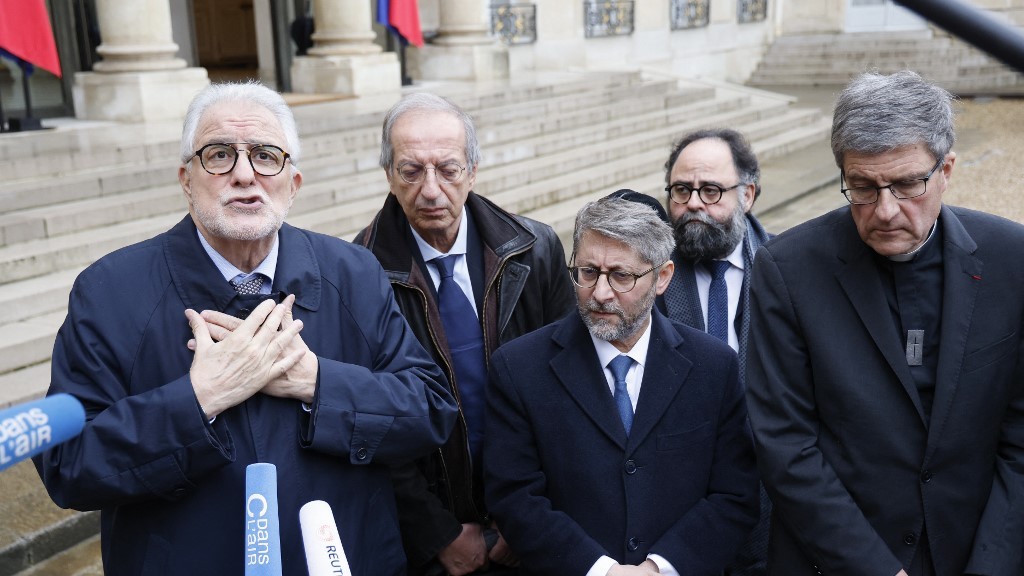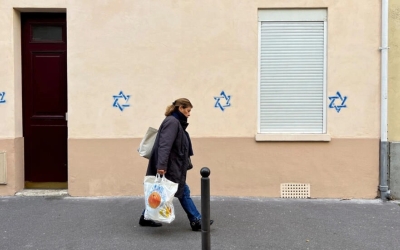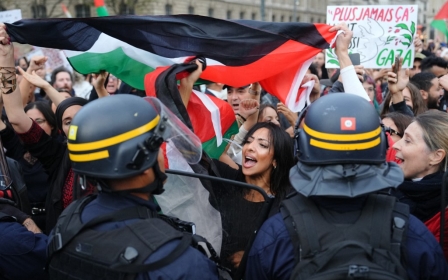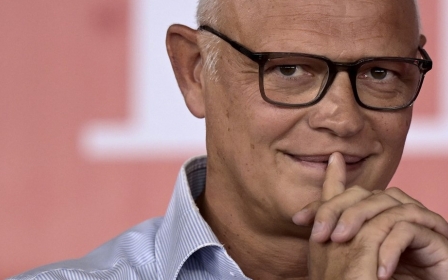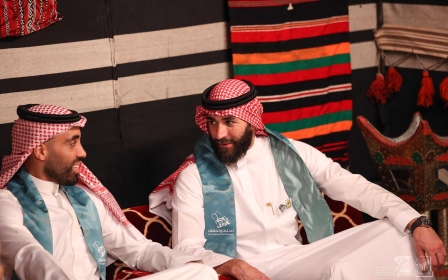Israel-Palestine war: Anti-Muslim racism in France surges with 'full impunity'
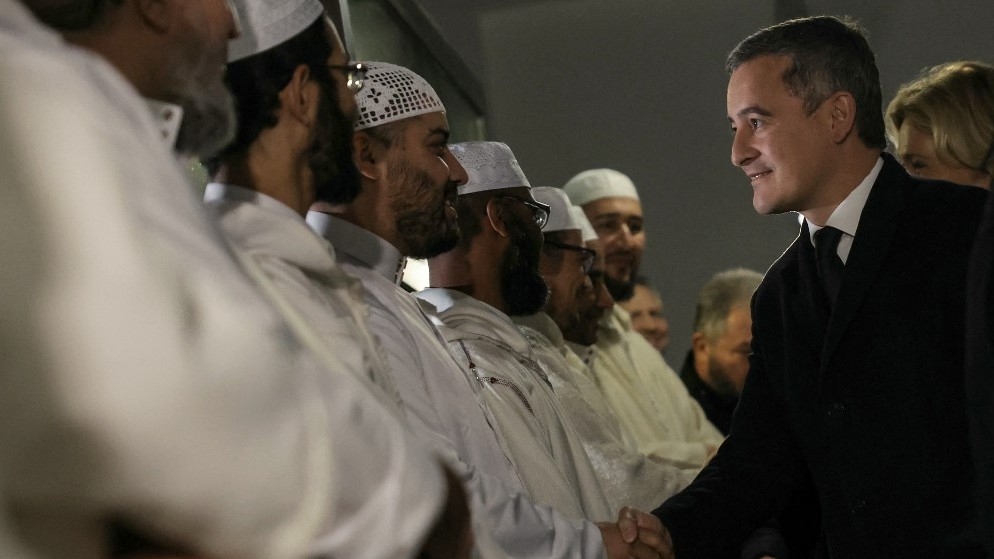
On 27 October, a Moldovan couple, living irregularly in France, were caught red-handed spray-painting stars of David on the walls of a residence in the 10th arrondissement of Paris.
Four days later, when questioned by journalists about the attack, Interior Minister Gérald Darmanin, who was at a Jewish community centre in Hauts-de-Seine at the time, evaded the question, expressing regret simultaneously that antisemitism was manifesting "in a form of radical Islam and far left".
The next day, the prosecutor confirmed the involvement of the Moldovan couple in the antisemitic graffiti case. The prosecutor also stated that this offence, along with other similar cases (250 antisemitic inscriptions in Paris and its nearby suburbs), was carried out at the request of a foreign sponsor.
According to French media, intelligence services are investigating whether the incidents were orchestrated by Russia.
Despite these revelations, Muslims continue to be scapegoated, particularly by the far right.
Since the Hamas attack on 7 October, the Ministry of the Interior in France said it has documented 1,518 antisemitic acts and statements - three times higher than the total for 2022.
Without citing evidence, Jordan Bardella, president of the National Rally (formerly the Front National), attributes such a surge in antisemitism to the alleged rise of "political Islam that has taken root in many neighbourhoods".
As tensions escalate in France during this particularly deadly phase of the Israeli-Palestinian conflict, with 1,200 deaths reported in Israel and over 11,300 Palestinians killed in Gaza bombardments, this conflation worries the Muslim community.
Follow Middle East Eye's live coverage of the Israel-Palestine war
Abdallah Zekri, a member of the leadership of the French Council of Muslim Worship (CFCM) and president of the Observatory against Islamophobia (OCI), denounced what he described as the "instrumentalisation of violence in the Middle East to fuel hatred against Muslims".
"We would like to be given the names of the alleged perpetrators [of antisemitic acts], to be told whether they are truly French Muslims, or rather racists, activists from identity movements, or foreigners," said Zekri.
In a statement, the CFCM refused to participate in the march against antisemitism and for the release of Israeli hostages held by Hamas, organised on Sunday 12 November at the request of the presidents of the Senate and the National Assembly. The CFCM criticised "an initiative that is not conducive to unity" as it overlooks "the resurgence of Islamophobic acts in France".
Zekri added that many mosques and Muslims in France have been subjected to direct threats, including on news channels and social media, where "an uninhibited outpouring of hatred against Muslims is expressed daily with full impunity".
On the LCI channel in late October, Pascal Perri, a commentator, alleged the existence of "couscous Islamism" linked to the "historical conflict" between Jews and Muslims.
Arno Klarsfeld, a Franco-Israeli jurist and magistrate at the Council of State, echoed these sentiments on CNEWS, stating that the current increase in antisemitic acts "comes mainly from a part of the Muslim population".
'There is not the same reaction when injurious statements target Muslims'
He went further, claiming that "Muslims, many of whom work on construction sites, have access to explosives, can have access to firearms; if there were a call to kill Jews, there could be an attack every day."
His statements are currently the subject of a complaint with the Audiovisual and Digital Communication Regulatory Authority (Arcom).
"The incitement to racial hatred is very clear in the statements made by Arno Klarsfeld," said lawyer Sefen Guez Guez, one of the attorneys involved in the complaint, who expressed surprise to MEE about the lack of reaction from the Council of State.
"There is not the same reaction when injurious statements target Muslims," the lawyer remarked.
On the other hand, the rector of the Grand Mosque of Paris, Chems-Eddine Hafiz, is concerned about the "gradual release" of an "essentialist, stigmatising, racist, and hateful discourse against Muslims in France".
In a statement released on 2 November, he expressed alarm at the "scandalous and reprehensible statements" made "by certain political and media figures" intending, in his view, "to cast shame on our Muslim fellow citizens and exclude them from the national community."
Political leaders silent
The Collective Against Islamophobia in Europe (CCIE), an organisation based in Belgium that has recently launched an online petition addressed to Arcom, also denounces "the media treatment reserved for Muslim communities".
Alongside hate speech, Islamophobic acts have been reported since 7 October, such as the one targeting the premises of a Franco-Turkish cultural association in Loiret, where the wall was tagged with the words "death to Islam".
In Cannet, in the Alpes-Maritimes, on 17 October, a septuagenarian was subjected to a racist attack while heading to the mosque.
'Islamophobia is gaining ground in recent weeks in the silence of political leaders'
- Sabrina Sebaihi, MP
According to attorney Guez Guez, who took on the case, the elderly man was hit with punches and a hammer. The assailants reportedly made racist remarks, shouting, "Dirty Arab, I'll cut you into pieces and send you to Jerusalem."
A few days later, Sabrina Sebaihi, a member of parliament for the coalition Europe Ecology- Greens-NUPES, revealed in a post on X a threatening letter addressed to a mosque in Nanterre, her hometown.
The letter, signed "Les amis de Charles Martel" (Friends of Charles Martel), referring to the eighth-century Frankish leader celebrated by far-right circles for stopping the Umayyad troops' advance at Poitiers, warns Muslims that their schools, places of worship, businesses and neighbourhoods will be burned if they target symbols of the French republic and the Christian religion.
"It's despicable," tweeted the parliamentarian, who believes that "Islamophobia is gaining ground in recent weeks in the silence of political leaders."
The interior minister, who eventually responded to the incident, announced the opening of an investigation. He also sought to reassure French Muslims, stating that the state protects them in the same way as other religious communities. According to Darmanin, "there are additional anti-Muslim acts, but it is not on the scale of what we know for antisemitism".
However, according to Vincent Geisser, a researcher at CNRS and the Institute of Research and Studies on the Arab and Muslim World, by linking "antisemitism and Islam in the neighbourhoods" authorities contribute to the stigmatisation of Muslims.
"The religious interpretations of the pro-Palestinian commitment of post-colonial generations provide a particularly effective and persuasive framework for interpretation, anxiously linking two 'radicalisms': Islamism and anti-Zionism, supposed to share the same hatred of Israel," he explains to MEE.
The political scientist also notes that "the conversion of certain far-right circles to a pro-Israel position" serves as a means "to settle scores with Muslims" and "consolidate their anti-Arab ideology".
The former president of the National Rally, Marine Le Pen, boasted after the Hamas attack that "the National Rally is the only political movement capable of protecting our compatriots of the Jewish faith from the deadly danger posed by the development of Islamist fundamentalism."
On 12 November, she participated in the march against antisemitism. The president of Reconquest (a far right party), Eric Zemmour, who also marched, alleged that "the rise of antisemitism is proportional to the rise of Arab-Muslim immigration".
* This article was originally published in French.
Middle East Eye propose une couverture et une analyse indépendantes et incomparables du Moyen-Orient, de l’Afrique du Nord et d’autres régions du monde. Pour en savoir plus sur la reprise de ce contenu et les frais qui s’appliquent, veuillez remplir ce formulaire [en anglais]. Pour en savoir plus sur MEE, cliquez ici [en anglais].


